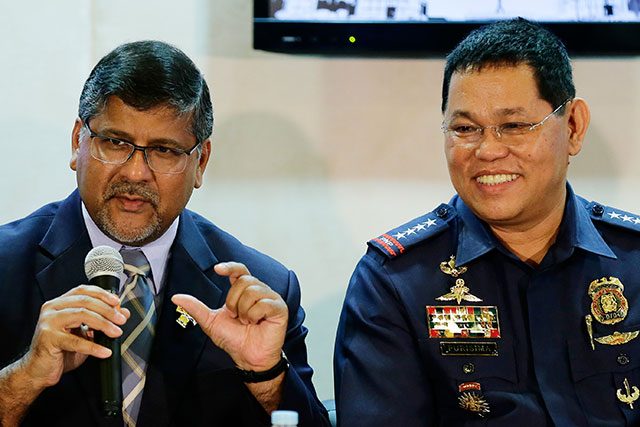SUMMARY
This is AI generated summarization, which may have errors. For context, always refer to the full article.

MANILA, Philippines – Despite a series of operations conducted by the Philippine National Police (PNP) to apprehend syndicates suspected to be behind an online “sextortion” scheme, foreign officials say the problem is not the Philippines’ alone.
“I cannot emphasize more that this is not a Philippine-specific problem. It really is a global phenomenon,” United Kingdom ambassador to the Philippines Asif Ahmad said during a Friday, May 2, press conference on the arrest of at least 58 suspects involved in the online-based extortion scheme.
Ahmad told reporters that prior to assuming his current position, he was briefed on the status of cybercrime in the region. UK police, he added, are deployed in the region specifically to thwart cyber criminals, many of whom target British nationals.
“This is a good example of when people say: Why do you go to international conferences? Our people, the Interpol (International Criminal Police Organization), and others started speaking. And the guys in the Philippines said: we are ready. And you need to keep a lid on this until you are ready,” added Ahmad.

The result? The first of Interpol’s involvement in ending the “sextortion” scheme.
‘Model’ for future operations
Interpol Digital Crime Center Director Sanjay Virmani said the PNP’s successful operations can be a “model” for similar tasks in other countries.
“What we really got was that it showed a model of what works in combating this. You really can’t have just one single entity, one agency,” Virmani told Rappler on the sidelines of the press conference.
He admitted, though, that multi-agency operations aren’t always the easiest thing to do. “It needs to be a collaborative effort in a trusted environment to work together,” Virmani added.Also present during the press conference in the PNP headquarters in Camp Crame were police officials from Scotland and Hong Kong, as well as representatives from the US Homeland Security Department.
It took almost 6 months for the first arrest to happen. Virmani said Interpol is eyeing other countries to undergo similar operations, but declined to give specifics.
In September 2014, Inteprol is expected to launch its Global Complex for Innovation. Even if the complex itself isn’t done yet, Virmani said they are “developing a platform to bring member countries together, to share information.”
Vulnerable to ‘sextortion?’
According to police, suspects lured their “clients” by adding them as friends on social networking sites such as Facebook. Once a friendship was established, suspects would move the conversation over to Skype, where they would convince and later record sex acts without the consent of their “clients.”
A teenage boy in Scotland committed suicide in July 2013 after being tormented for months by extortionists based in the Philippines. It was Daniel Perry’s suicide that first started the worldwide operation.
PNP Anti-Cybercime Group chief Senior Superintendent Gilbert Sosa said syndicates were becoming more and more careful in doing their transactions.
“They devised a payment system that you can’t track easily. The money that we have as evidence is not reflective of the overall money that they have amassed,” he said.
One thing is for sure, officials said: the extortionists targeted whoever they viewed as vulnerable – from curious teenagers to “lonely” older men.
The pattern, said Virmani, was that countries that use English as their “Internet language” were likely to be victimized. It also explained why “sextortion” groups thrived in the Philippines, the world’s 5th largest English-speaking country.
Virmani added in Africa, Interpol had detected syndicates targeting France and French-speaking countries.
International police admit there’s a lot that needs to be done, and the Philippines is only step one. “The significance of it really is, it enabled a disruption of the activity to take place,” added Virmani. – Rappler.com
Add a comment
How does this make you feel?
There are no comments yet. Add your comment to start the conversation.